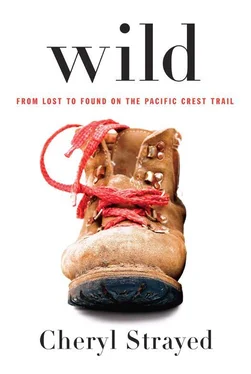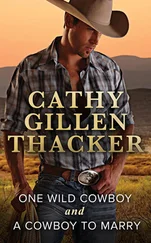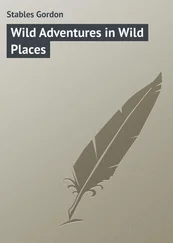Cheryl Strayed - Wild
Здесь есть возможность читать онлайн «Cheryl Strayed - Wild» весь текст электронной книги совершенно бесплатно (целиком полную версию без сокращений). В некоторых случаях можно слушать аудио, скачать через торрент в формате fb2 и присутствует краткое содержание. Год выпуска: 2012, ISBN: 2012, Жанр: Современная проза, на английском языке. Описание произведения, (предисловие) а так же отзывы посетителей доступны на портале библиотеки ЛибКат.
- Название:Wild
- Автор:
- Жанр:
- Год:2012
- ISBN:978-0-307-95765-8
- Рейтинг книги:4 / 5. Голосов: 1
-
Избранное:Добавить в избранное
- Отзывы:
-
Ваша оценка:
- 80
- 1
- 2
- 3
- 4
- 5
Wild: краткое содержание, описание и аннотация
Предлагаем к чтению аннотацию, описание, краткое содержание или предисловие (зависит от того, что написал сам автор книги «Wild»). Если вы не нашли необходимую информацию о книге — напишите в комментариях, мы постараемся отыскать её.
Wild — читать онлайн бесплатно полную книгу (весь текст) целиком
Ниже представлен текст книги, разбитый по страницам. Система сохранения места последней прочитанной страницы, позволяет с удобством читать онлайн бесплатно книгу «Wild», без необходимости каждый раз заново искать на чём Вы остановились. Поставьте закладку, и сможете в любой момент перейти на страницу, на которой закончили чтение.
Интервал:
Закладка:
I excused myself from the others and walked slowly through the lodge, then stepped out onto a wide south-facing patio. It was a clear, sunny day and I could see for more than a hundred miles. The view included so many of the mountains I’d hiked past — two of the Three Sisters and Mount Jefferson and Broken Finger.
Hop, skip, spin, done , I thought. I was here. I was almost there. But I wasn’t done. I still had fifty miles to walk before I reached the Bridge of the Gods.
The next morning I said goodbye to Doug and Tom and the two women and I hiked away alone, climbing up the short steep path that went from the lodge to the PCT. I passed under the ski lift and edged my way north and west around the shoulder of Mount Hood on a trail of what seemed to be demolished rock, worn down by the harsh winters into a pebbly sand. By the time I crossed into the Mount Hood Wilderness twenty minutes later, I had entered the forest again and I felt the silence descend on me.
It felt good to be alone. It felt spectacular. It was the middle of September, but the sun was warm and bright, the sky bluer than ever. The trail opened up into miles-wide views and then closed around me into dense woods before opening back up again. I walked for ten miles without pause, crossed the Sandy River, and stopped to sit on a small flat shelf looking over it from the other side. Nearly all the pages of The Pacific Crest Trail, Volume 2: Oregon and Washington were gone by now. What was left of my guidebook was folded into the pocket of my shorts. I took out the pages and read them again, letting myself go all the way to the end. I was thrilled by the prospect of reaching Cascade Locks and also saddened by it. I didn’t know how living outdoors and sleeping on the ground in a tent each night and walking alone through the wilderness all day almost every day had come to feel like my normal life, but it had. It was the idea of not doing it that scared me.
I went to the river and squatted down and splashed my face. It was narrow and shallow here, so late in the summer and so high up, barely bigger than a stream. Where was my mother? I wondered. I’d carried her so long, staggering beneath her weight.
On the other side of the river , I let myself think.
And something inside of me released.
In the days that followed, I passed Ramona Falls and skirted in and out of the Columbia Wilderness. I caught views of Mounts St. Helens and Rainier and Adams far to the north. I reached Wahtum Lake and turned off the PCT and onto the alternate route the authors of my guidebook recommended, which would lead me down to Eagle Creek and into the Columbia River gorge and eventually to the river itself that ran alongside the town of Cascade Locks.
Down, down, down I went on that last full day of hiking, descending four thousand feet in just over sixteen miles, the creeks and streams and trailside seeps I crossed and paralleled going down and down too. I could feel the river pulling me like a great magnet below and to the north. I could feel myself coming to the end of things. I stopped to spend the night on the banks of Eagle Creek. It was five o’clock and I was only six miles away from Cascade Locks. I could have been in town by dark, but I didn’t want to finish my trip that way. I wanted to take my time, to see the river and the Bridge of the Gods in the bright light of day.
That evening I sat next to Eagle Creek watching the water rush over the rocks. My feet were killing me from the long descent. Even after all this way, with my body now stronger than it had ever been and would likely ever be, hiking on the PCT still hurt. New blisters had formed on my toes in places that had gone soft from the relatively few extreme descents throughout Oregon. I put my fingers delicately to them, soothing them with my touch. Another toenail looked like it was finally going to come off. I gave it a gentle tug and it was in my hand, my sixth. I had only four intact toenails left.
The PCT and I weren’t tied anymore. The score was 4–6, advantage trail.
I slept on my tarp, not wanting to shelter myself on that last night, and woke before dawn to watch the sun rise over Mount Hood. It was really over, I thought. There was no way to go back, to make it stay. There was never that. I sat for a long while, letting the light fill the sky, letting it expand and reach down into the trees. I closed my eyes and listened hard to Eagle Creek.
It was running to the Columbia River, like me.
I seemed to float the four miles to the little parking area near the head of the Eagle Creek Trail, buoyed by a pure, unadulterated emotion that can only be described as joy. I strolled through the mostly empty parking lot and passed the restrooms, then followed another trail that would take me the two miles into Cascade Locks. The trail turned sharply to the right, and before me was the Columbia River, visible through the chain-link fence that bordered the trail to set it off from Interstate 84 just below. I stopped and grasped the fence and stared. It seemed like a miracle that I finally had the river in my sights, as if a newborn baby had just slipped finally into my palms after a long labor. That glimmering dark water was more beautiful than anything I’d imagined during all those miles I’d hiked to reach it.
I walked east along a lush green corridor, the roadbed of the long-abandoned Columbia River Highway, which had been made into a trail. I could see patches of concrete in places, but the road had mostly been reclaimed by the moss that grew along the rocks at the road’s edge, the trees that hung heavy and low over it, the spiders who’d spun webs that crossed its expanse. I walked through the spiderwebs, feeling them like magic on my face, pulling them out of my hair. I could hear but not see the rush of automobiles on the interstate to my left, which ran between the river and me, the ordinary sound of them, a great whooshing whine and hum.
When I emerged from the forest, I was in Cascade Locks, which unlike so many towns on the trail was an actual town, with a population of a little more than a thousand. It was Friday morning and I could feel the Friday morningness emanating from the houses I passed. I walked beneath the freeway and wended my way along the streets with my ski pole clicking against the pavement, my heart racing when the bridge came into view. It’s an elegant steel truss cantilever, named for a natural bridge that was formed by a major landslide approximately three hundred years ago that had temporarily dammed the Columbia River. The local Native Americans had called it the Bridge of the Gods. The human-made structure that took its name spans the Columbia for a little more than a third of a mile, connecting Oregon to Washington, the towns of Cascade Locks and Stevenson on either side. There’s a tollbooth on the Oregon side and when I reached it the woman who worked inside told me I could cross the bridge, no charge.
“I’m not crossing,” I said. “I only want to touch it.” I walked along the shoulder of the road until I reached the concrete stanchion of the bridge, put my hand on it, and looked down at the Columbia River flowing beneath me. It’s the largest river in the Pacific Northwest and the fourth largest in the nation. Native Americans have lived on the river for thousands of years, sustained by its once-bountiful salmon for most of them. Meriwether Lewis and William Clark had paddled down the Columbia in dugout canoes on their famous expedition in 1805. One hundred and ninety years later, two days before my twenty-seventh birthday, here I was.
I had arrived. I’d done it. It seemed like such a small thing and such a tremendous thing at once, like a secret I’d always tell myself, though I didn’t know the meaning of it just yet. I stood there for several minutes, cars and trucks going past me, feeling like I’d cry, though I didn’t.
Читать дальшеИнтервал:
Закладка:
Похожие книги на «Wild»
Представляем Вашему вниманию похожие книги на «Wild» списком для выбора. Мы отобрали схожую по названию и смыслу литературу в надежде предоставить читателям больше вариантов отыскать новые, интересные, ещё непрочитанные произведения.
Обсуждение, отзывы о книге «Wild» и просто собственные мнения читателей. Оставьте ваши комментарии, напишите, что Вы думаете о произведении, его смысле или главных героях. Укажите что конкретно понравилось, а что нет, и почему Вы так считаете.












